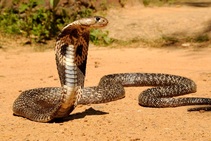What to do when encountering dangerous animals in jungle?
Imagine that you have to spend a night in a jungle. Be it with friends or alone, it will always be a terrifying experience for greenhorns who have never stepped into the wild. We will sharing some tips we has researched. Below are among 3 wildlife you wouldn’t want to meet in jungle.

1. King Cobra
Now we know the name King Cobra certainly will certainly make send shivers down most people’s spines, except for a few exceptional brave souls. So what kind of business do, should you run into one?
If you ever run into a Cobra of any kind in the woods, do not make any sudden movements. Next move, stay still and retreat slowly. A cobra doesn’t bite when it’s hood has fully expanded, it will only bite when it’s head is half-expanded. Thus, we allow it to fully expand its hood and do a slow, gradual retreat.
2. Apes/Primates
Apes do not exactly have a reputation as savage animals. However, they can be quite a handful particularly when they come in gangs out to steal your food (might not be true, but that’s what apes in cities do anyway.)
The ape species will not run away when we try to chase it away with sticks. In fact, they are even more agile than the movement of our sticks. To chase them away, what you should be doing, is to snap the branches of shrubs, together with the leaves, and wave them at the apes, and chances are the apes will run away. The logic is that the branches with leaves of the shrub looks bigger than a single stick.
3. Sun Bear
The Malayan Sun Bear is a species commonly found around the South East Asia region, and even China. Despite their small size, they can be quite dangerous, they are bears after all.
These bears usually stay at swamp areas around Malaysia; usually identified by their minute size and it’s orange-coloured chest. If you ever run into one in the wild, shout and act as if you’re gonna chase it, the bear will automatically run away.
We hope that the tips will be of some help to you in the future. We however, do not guarantee the effectiveness of such methods. Please do seek professional advice should you decide to venture to the forest in Malaysia! Best is if you are with the locals. They can be an experts in dealing with these dangerous animals.
* Disclaimer: information is as picked up from the indigenous people (Orang Asli) from Peninsula Malaysia.



